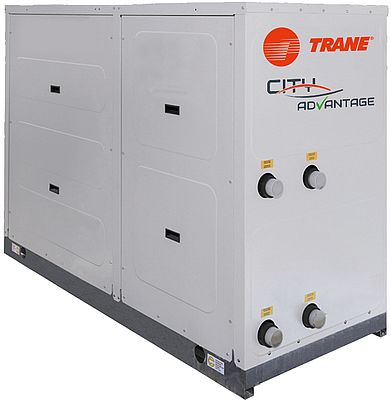Trane®, global provider of indoor comfort solutions and services and a brand of Trane Technologies, announced the CITY Advantage, its new compact scroll water-cooled chillers and water source heat pumps with low global warming potential (GWP) R-454B refrigerant. The CITY Advantage models expand the Trane CITY portfolio of compact products designed to provide all year-round cooling and/or heating with a reduced footprint to fit small commercial buildings, industrial facilities and processes.
“Reducing the heating and cooling systems’ contribution to energy consumption and CO2 emissions in buildings and cities is what innovation at Trane stands for,” said Louis Rompre, portfolio manager at Trane in Europe, Middle East and Africa. ”Solutions like the CITY Advantage create opportunities to push the boundaries in making the buildings perform better and be more environmentally friendly. The CITY Advantage adds to Trane’s growing portfolio designed to replace the existing fossil-fuel boiler and chiller system and deliver both chilled and hot water for the entire building with no direct greenhouse gas emissions.”
The Trane CITY Advantage water to water heat pump units offer very high seasonal efficiency values and address the environmental and sustainability efforts in urban areas offering an efficient alternative for gas or oil fuelled boilers and compatibility with geothermal applications. Thanks to the R-454B refrigerant – the lowest GWP refrigerant for scroll technology on water cooled scroll units – the Trane CITY Advantage offers market leading operating maps with leaving water temperatures of up to 65°C.
“The combination of low GWP refrigerant, wide operating maps and highest in class efficiencies offers building owners a unique opportunity in the market to ensure flexible, high performance, and sustainable heating and cooling,” said Louis Rompre.
An overall approach to reducing carbon emissions in the industries and markets Trane serve
The new CITY Advantage models with R-454B are substantially efficient offering: 11% better Seasonal Energy Efficiency Ratio (SEER) in cooling mode. Up to 5% better Seasonal Coefficient of Performance (SCOP) in pure heating mode.
Available in capacities of up to 700kW from a single unit, the CITY Advantage’s compact, modular design comes with new generation of Trane controls technology – Tracer Symbio™800 controller - featuring advanced algorithms ensuring smooth, reliable operation with the low cost of ownership.
Other key features of the Trane CITY Advantage range include: Wide operating maps allows for more hospitals, office buildings, larger apartment buildings, warehouses and industrial applications across Europe to benefit from the CITY Advantage capabilities and move away from fossil-fuel based heating systems :Chilled water temperatures between -7°C and +25°C; Hot water temperatures up to +65°C; Optimized for connection to HVAC systems based on air handling units, under floor heating, radiators or chilled beams; Compact and smart design allowing for moving the unit through doors and into service elevators and positioning it with a long side adjacent to the wall, while ensuring full access to major components.
Trane offers the low global warming potential (GWP) R-454B refrigerant across its entire portfolio of scroll compressor chillers, heat pumps, multi-pipe units and rooftops. The R-454B refrigerant, a non-ozone depleting HFO/HFC[1] blend, has a GWP level of 467, the lowest among the refrigerants available today for scroll compressor technology. R-454B offers 76% reduction in direct GWP impact against R-410A and 34% reduction against R-32 refrigerant. This answers customers’ need for a sustainable, highly efficient refrigerant option that future proofs their investment and mitigates the increasing tax rates put on refrigerants across Europe.
Providing sustainable cooling and heating solutions is part of Trane’s and Trane Technologies’ overall approach to reducing carbon emissions in the industries and markets they serve. It helps advance the 2030 Sustainability Commitments, including the Gigaton Challenge to reduce customer greenhouse gas emissions by 1 billion metric tons.
























































